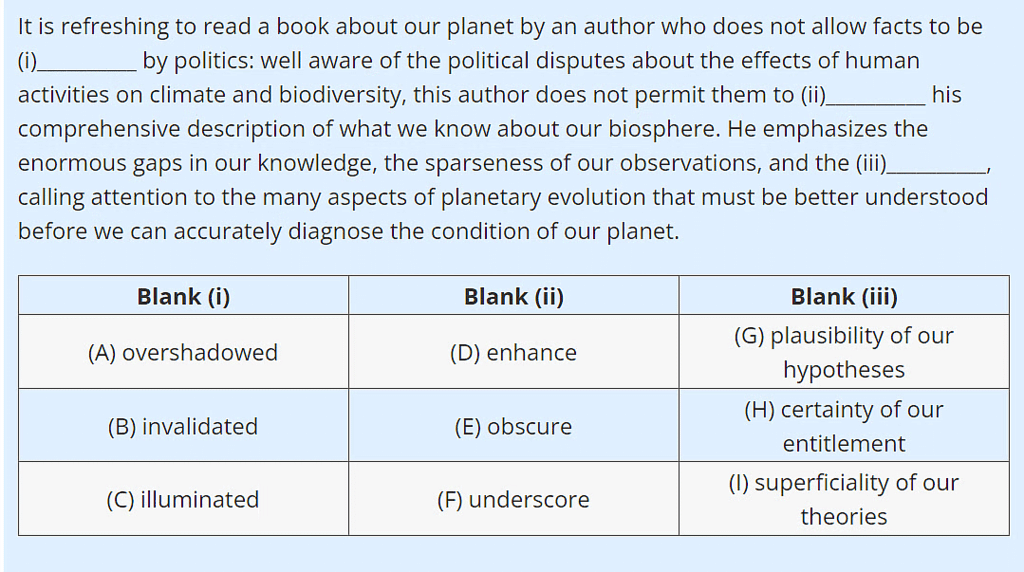Important Concepts & Tips: Text Completion | Verbal Reasoning for GRE PDF Download
| Table of contents |

|
| What is Text Completion in GRE? |

|
| How To Approach GRE Text Completion? |

|
| Tips for GRE Text Completion |

|
| Solved Examples |

|
What is Text Completion in GRE?
The GRE text completion section assesses how you interpret and evaluate information presented to you based on your reasoning skills. This is done by omitting critical words from short passages which you need to fill up by using the remaining information in the passage to create a logical and meaningful passage.
A typical GRE text completion question features a sentence or short passage where one, two or three words are left blank.
There are 3 types of Text completion questions:
- Single-blank: These questions have a single blank to be filled up. For sentences or passages with a single blank, you will have to choose the right option from five given words. You can expect four single-blank questions in total (2 per section)
- Double-blank: Double-blank text completion questions have two blanks to be filled up. You will have to choose the right answer from the three given options. You may expect around four to five double-blank questions. (2-3 per section)
- Triple-blank: Triple-blank text completion passages have three blanks which need to be filled. Three options will be given from which you will have to pick up the right word and you can expect roughly three to four triple-blank questions. (1-2 per section)

How To Approach GRE Text Completion?
1. Understand the context: Read the entire passage carefully and try to understand the context before looking at the blank. The context can help you determine what type of word is needed to fill in the blank. Attempting to answer without reading the entire sentence could increase your chances of making mistakes.
2. Try To Come Up With Your Own Answer First: After you read all the sentences carefully, try to come up with words that you think would fit in the sentence, then see if similar words are offered among the answer choices. Now, use the process of elimination to narrow down your choices. Eliminate options that do not make sense in the context of the passage or that do not fit grammatically.
3. Consider the tone: Consider the tone of the passage and choose words that match the overall tone and style.
4. Pay attention to signal words: Pay attention to signal words such as "however," "although," and "despite." These words can help you determine the relationship between different parts of the passage and what type of word is needed to fill the blank.
5. Use context clues: Look for context clues in the sentence or passage that can help you determine the meaning of the missing word. Context clues can include synonyms, antonyms, and other words that provide clues to the meaning of the missing word.
6. Fill Up The Blanks That Are Easier: Always fill up the blanks whose answer you know for sure and the blanks that are easier. It is not necessary that the first blank is the one that should be filled first. Therefore, solve whatever feels easier and do not waste much time on the difficult questions because you can always come back and solve the difficult questions later.
7. Read The Entire Sentence After Filling Up The Answers: Make sure that you read the entire passage/sentence once again after filling up all the answers to check if everything makes sense as a whole and if everything sounds logical, grammatically and stylistically correct.
Tips for GRE Text Completion
- Read the Whole Sentence First: Begin by reading the entire sentence or passage before considering any answer choices.
- Pre-Think Word Choices: Before looking at answer options, think about what words would fit in the blanks, providing a guide for assessing choices.
- Consider Word Valence: Decide whether a positive or negative word is appropriate for each blank, aiding in selecting the right answer.
- Identify Signal Words: Look for signal words and transitions that indicate the overall structure of ideas within the sentence or passage.
- Strategic Guessing: When guessing, eliminate incorrect choices before making a selection, increasing the chance of a correct answer.
- Review Multi-Blank Choices: After choosing words for multiple blanks, review the entire passage to ensure coherence and sense.
- Equal Weight for Every Question: Remember that each text completion question holds the same point value, so manage time wisely and don't get overly focused on complex questions when simpler ones remain.
Solved Examples
1. One Blank
Q: Most spacecraft are still at little risk of collision with space debris during their operational lifetimes, but given the numbers of new satellites launched each year, the orbital environment in the future is likely to be less ________.
A. crowded
B. invulnerable
C. protected
D. polluted
E. benign
Ans: Option E
Sol:
Given that the blank appears at the end of the passage, understanding the information provided is relatively straightforward. The sentence conveys that current spacecraft face minimal collision risk with space debris, but the launch of new satellites each year is increasing. The task is to determine how the growing number of satellites will impact the future orbital environment.
In essence, we need to predict the effect of the increased satellites on the future orbital setting. The crucial question arises: how will the surge in satellite launches influence the orbital environment? More satellites imply more debris, potentially heightening the risk of collisions.
However, it's important to note that the blank seeks to describe what the increased number of satellites will make the orbital environment less like, rather than what it will become more like. Consequently, options suggesting that the environment will become less "crowded" or "polluted" can be eliminated initially. Moving forward, choices such as "invulnerable" and "protected" may seem tempting, as the heightened risk of collision could make satellites less safe. Yet, these adjectives are meant to modify the orbital environment itself, not the satellites.
This leads us to the most fitting choice, (E) "benign," signifying "harmless." The orbital environment will be less benign with more satellites, as the increased risk of collision makes it less harmless. This aligns logically, making (E) the correct answer.
2. Two Blanks
Q: A newly published, laudatory biography of George Bernard Shaw fails, like others before it, to capture the essence of his personality: the more he is (i)_________, the more his true self seems to (ii)_________.

Ans: discussed, disappear
Sol: The initial part of the sentence introduces two main ideas: firstly, that the biography praises George Bernard Shaw, and secondly, that it inadequately portrays his personality. Since the biography speaks highly of Shaw, we can infer for the first blank (i) that it does not belittle or ignore him. Therefore, the biography must "discuss" him.
Considering the biography's failure to capture Shaw's personality, the most fitting description for what his true self would do in the biography is likely to "disappear." It is improbable that his true self would "emerge" or "coalesce," both of which suggest an appearance. Therefore, the accurate choices for this sentence are "discussed" and "disappear."
3. Multiple Blanks
Q: If one could don magic spectacles—with lenses that make the murky depths of the ocean become transparent—and look back several centuries to an age before widespread abuse of the oceans began, even the most (i) __________ observer would quickly discover that fish were formerly much more abundant. Likewise, many now-depleted species of marine mammals would appear (ii) __________. But without such special glasses, the differences between past and present oceans are indeed hard to (iii) __________.
 Ans: casual, plentiful, and discern.
Ans: casual, plentiful, and discern.
Sol: Summing it up, this challenging three-blank text completion centers around the concept of "magic spectacles" that enable clear vision of the deep ocean and the ability to see back in time before widespread ocean abuse. The passage suggests a theme of the ocean's historical deterioration.
In the first blank, the text emphasizes that even a casual observer would notice the past abundance of fish, making choices like "prescient" or "clearheaded" less fitting. Moving on, the next sentence echoes the idea, emphasizing a similar past abundance, making "plentiful" the most appropriate choice for the second blank.
As the passage introduces a counterpoint with "but" in the third blank, it signals that without the special glasses, the differences between the past and present ocean would be less obvious. Here, "discern" aligns well with the notion of difficulty in noticing these differences. Therefore, the selected choices are "casual," "plentiful," and "discern."
|
44 videos|41 docs|83 tests
|
FAQs on Important Concepts & Tips: Text Completion - Verbal Reasoning for GRE
| 1. What is Text Completion in GRE? |  |
| 2. How to approach GRE Text Completion? |  |
| 3. Tips for GRE Text Completion? |  |
| 4. What are some important concepts and tips for Text Completion in GRE? |  |
| 5. What are some solved examples of GRE Text Completion questions? |  |





















